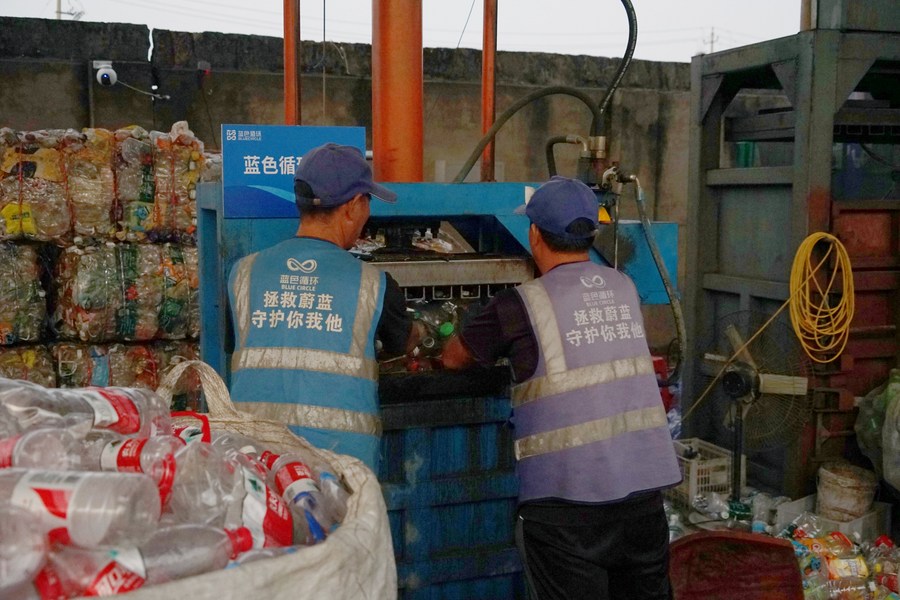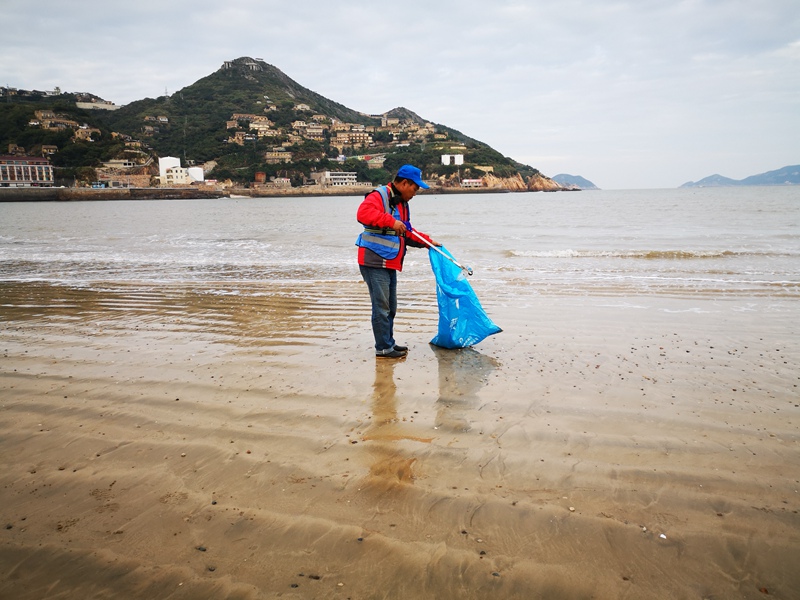Zhejiang's innovative strategy to combat oceanic plastic pollution
Blue Circle, a new model for processing marine plastic waste initiated jointly by the Department of Ecology and Environment of Zhejiang Province in east China and VisionBlue Technology, a Zhejiang-based technology company, won the 2023 Champions of the Earth Award. This award, the U.N.'s highest environmental honor, recognizes the initiative's innovative efforts in reducing marine pollution.
"They give us hope that we can tackle plastic pollution and remind us that protecting nature is key to achieving sustainable development," said Sheila Aggarwal-Khan, director of the Economy Division of the U.N. Environment Programme (UNEP).
The program, combining government guidance with market incentives, encourages coastal residents to collect marine plastic waste in collaboration with plastics companies. Launched in 2020, the program aims to protect the environment and boost the incomes of coastal communities.

Workers compress sorted plastic bottles at a "Blue Circle Home" in Jiaojiang District of Taizhou City, east China's Zhejiang Province, Oct. 17, 2023. (Xinhua/Lin Guangyao)
More than 6,300 residents and fishermen, 10,180 vessels, and 230 companies in Zhejiang actively participate in the program. So far, they have collected about 10,936 tonnes of marine waste, including approximately 2,254 tonnes of plastic waste. This effort has led to a reduction of approximately 2,930 tonnes of carbon emissions and a significant improvement in the coastal marine environment, according to Lang Wenrong, director of the Department of Ecology and Environment of Zhejiang Province.
Marine plastic pollution poses a significant challenge to the protection of marine ecology. A report by the UNEP states that plastics constitute the largest, most harmful, and most persistent portion of marine litter, making up at least 85 percent of all marine waste.
Zhejiang, with a sea area of 260,000 square kilometers and 4,350 islands, faces significant challenges and pressure in strengthening marine ecological environmental protection and addressing marine plastic pollution.
The Blue Circle program, which integrates digital technologies such as the Internet of Things (IoT) and blockchain, visually tracks the recycling and remanufacturing process of marine plastics, said Xie Huan, director of the Ecology and Environment Bureau of Taizhou city, Zhejiang Province.
In Luqiao district of Taizhou, 74-year-old fisherman Chen Xiafang now earns extra income by collecting marine garbage.
"Every day in my spare time, I pick up plastic waste on the coastline and send it to a 'Blue Circle Home,' which gives me a monthly payment of around 700 yuan ($98)," said Chen. "Blue Circle Home" is a marine garbage treatment center responsible for recycling and sorting marine plastic waste.
The Blue Circle program has led to an increase in the price of ocean plastic waste.
Li Qiming, a 54-year-old worker at a seafood processing factory, regularly collects plastic bottles on the beach in his spare time.

Li Qiming collects plastic bottles on the beach in a park in Wenling city, east China's Zhejiang Province. (Photo/Liu Yi)
Li said he can collect hundreds of bottles in a day, which allows him to earn between 1,000 and 2,000 yuan per month.
At dusk, Li brings two large bags of plastic bottles to a "Blue Circle Home." Zhang Wenxiang, the person in charge of the site, weighs the bottles, registers them on a mobile app, and generates a traceable QR code. After completing the necessary steps, Zhang pays Li a higher price for the bottles compared to regular waste plastic.
The high price of plastic collected from the ocean is due to a source tracing system for recycled plastic particles.
Liu Jia'an, a VisionBlue Technology technician, explained that using video and other traceable evidence allows international certification organizations to identify plastic particles from the Blue Circle program as ocean plastic. This certification commands a higher price for ocean plastic waste compared to ordinary plastic waste.
In Zhejiang's Taizhou, Ningbo, and Zhoushan cities, there are 15 collection and storage sites dedicated to marine plastic waste, with 11 located in Taizhou. These sites are pivotal for processing marine plastic waste, shredding and compressing it to decrease its volume by 70 percent, thereby making it easier to transport for recycling.
The success of the Blue Circle program heavily relies on Zhejiang's robust digital technology infrastructure. Advanced digital technology enables complete traceability of marine plastic waste, ensuring transparency throughout the entire process.
Frontline waste collectors, equipped with tools developed by VisionBlue Technology, such as video recorders, document the origin of plastic waste. Additionally, electronic fences installed near the coastline ensure that the plastic waste comes from within a 3-kilometer radius of the shoreline. Only waste from this area is considered marine plastic waste.
Marine plastic waste undergoes three stages of processing to transform it into recycled marine plastic particles, which are then used in producing textiles, packaging, automotive components, and more.
"Ocean plastic waste has been turned into treasure and reintegrated into our lives," says Fu Xianwei, operation director of Veolia Huafei Group, an eco-friendly manufacturer specializing in plastic waste recycling.
Veolia Huafei Group has processed about 10 million discarded plastic bottles collected from the ocean under the Blue Circle program.
"The production of plastic mainly relies on fossil fuels. The carbon emissions generated from producing one tonne of recycled ocean plastic particles are one tonne less than those from producing one tonne of virgin plastic particles. As a result, some domestic and international companies focused on environmental, social, and corporate governance prefer ocean plastic particles to meet their carbon reduction goals," Fu explains.
The Blue Circle program developed a visual traceability system based on blockchain and IoT technologies so that companies can know where their recycled plastic comes from.
Fang Min, operation director of VisionBlue Technology, showcased a notebook with a QR code. Scanning the code revealed that the notebook contains 12.13 grams of ocean plastic, leading to a reduction of 15.78 grams of carbon emissions.
According to Fu, products using ocean plastic waste as raw materials are currently priced significantly higher than similar products. Internationally certified ocean plastic particles hold greater potential for value appreciation compared to traditional recycled plastics.
The highest price for ocean plastic particles produced under the Blue Circle program has reached 30,000 yuan per tonne, over three times that of similar plastics. This development has dramatically excited Fang and his other colleagues.
A fund was established to ensure that the profits from selling products made from recycled plastics benefit those who collected the waste.
Frontline marine plastic waste collectors have seen an average monthly income increase of about 1,200 yuan. To date, a total of 120 million yuan in green financial loans has been distributed to fishermen.
"China has made significant strides in managing ocean plastic waste in recent years. Many coastal regions have established and enhanced marine sanitation systems while also exploring various effective practices," said Wang Juying, director of the National Marine Environmental Monitoring Center.
The Blue Circle program's receipt of the 2023 Champions of the Earth Award exemplifies China's dedication to tackling the global challenge of ocean plastic waste management, offering valuable solutions and insights to the international community, according to Wang.

 Scan the QR Code
Scan the QR Code